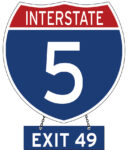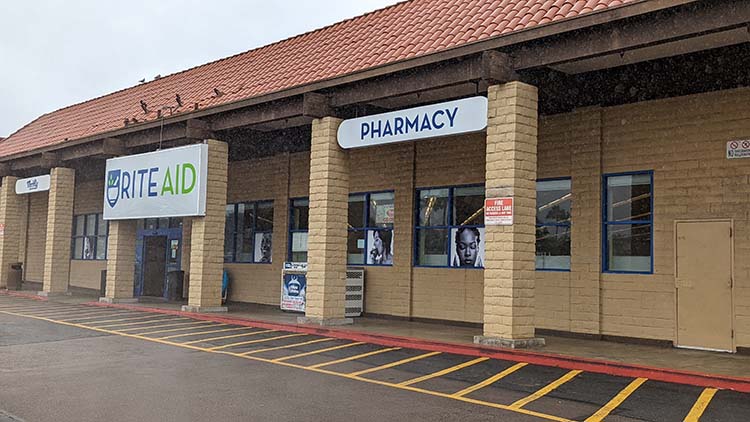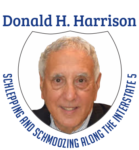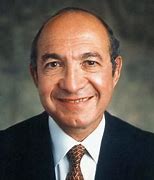 Editor’s Note: This is the 21st chapter in Volume 3 of Publisher and Editor Donald H. Harrison’s 2022 trilogy, “Schlepping and Schmoozing Along the Interstate 5.” All three books as well as others written by Harrison may be purchased from Amazon.com.
Editor’s Note: This is the 21st chapter in Volume 3 of Publisher and Editor Donald H. Harrison’s 2022 trilogy, “Schlepping and Schmoozing Along the Interstate 5.” All three books as well as others written by Harrison may be purchased from Amazon.com.
Schlepping and Schmoozing Along the Interstate 5, Volume 3, Exit 49 (Tamarack Avenue): Rite Aid
From northbound Interstate 5, take the Tamarack Avenue exit and turn right, then turn left into parking lot some 600 feet later. Rite Aid’s address is 955 Tamarack Avenue, Carlsbad.

 CARLSBAD, California – Alex Grass built Rite Aid into one of the largest chain drugstores in America and also was a major supporter of Jewish institutions in his home state of Pennsylvania, throughout the United States, Israel, and around the world.
CARLSBAD, California – Alex Grass built Rite Aid into one of the largest chain drugstores in America and also was a major supporter of Jewish institutions in his home state of Pennsylvania, throughout the United States, Israel, and around the world.
Grass opened Rite Aid in 1962 under the name of Thrift D Discount Center in Scranton, Pennsylvania. Initially, the store focused on beauty and health supplies. It grew to 50 stores by 1968, the year the company was renamed Rite Aid and taken public. Sale of stock netted Grass’s family $8.75 million, more than enough to finance the following year the purchase of the Daw Drug Company of Rochester, New York, thereby expanding Rite Aid into the sale of pharmaceuticals.
Grass’s father, Louis Grass, died in 1936 when Alex was 9 years old, prompting his widowed mother, Rose, to move to Florida. As young Grass grew older during the Great Depression, he held a variety of jobs, eventually working his way through the University of Florida Law School. His father’s early death “was probably the reason I worked so hard and wanted to achieve so much, because I started with so little,” Grass confided in 2000 to the Philadelphia Inquirer. “I learned early on how important it was to be economically sound and to be in a position where I could be independent,” he once told the Patriot-News of Harrisburg, Pennsylvania.
As an aspiring lawyer in Florida, Grass met Lois Lehrman, with whom he later had two daughters, Lois Shapiro Shembob and Elizabeth Grass Weese, and two sons, Martin and Roger, who would play important roles in his business life.
The young couple moved back to Pennsylvania, where Lois’s father, Benjamin, was the owner of the wholesale grocery supply concern known as Lehrman & Sons. Alex initially worked as a tax attorney for the Internal Revenue Service, and the Pennsylvania Department of Revenue. In 1951, he joined his father-in-law’s company, developing a program in 1958 called Rack Rite Distributors in which racks of non-grocery items were placed in grocery stores.

The public offering for Rite Aid came ten years later, and thereafter Grass embarked on a program of expansion. In 1972, the company had 267 stores in 10 states. Fifteen years later in 1987, the company passed the 2,000-store mark, thereby becoming the drugstore chain with the most outlets, although not the most revenue. In 1995, the year Alex retired, the company operated nearly 3,000 stores east of the Mississippi River.
Alex was succeeded by his son Martin Grass, whose desire to grow the company faster and faster and to outdo his father led to financial disaster for Rite Aid stockholders and a prison term for Martin.
One of Martin’s first acts, in 1996, was to acquire Thrifty PayLess Holdings, Inc; Harco, Inc; and K&B Incorporated, adding over 1,000 stores to the company. In the process he took on $900 million in assumed debt. In 1999, the last year of Martin’s reign, Rite Aid formed a strategic partnership with GNC, which retailed vitamins, minerals, herbal products, and sports nutrition, leading to GNC having “stores with stores” at Rite Aid locations.
Martin misreported revenues and sales to stockholders during his tenure, overstating the value of the company by $1.8 billion. Stocks had sold at $50 a share until the extent of Martin’s fraudulent activities became known. Then they dropped to less than $10, and continued a downward slide even after he was ousted from the company.
Before he was sentenced to eight years in federal prison by U.S. District Court Judge Sylvia Romo, Martin admitted, “Those things were wrong; those things were illegal,” however, he added, “I did not do them to line my own pockets.”
What caused the bad blood between Alex and Martin has not been explicitly reported, but one factor might have been Alex’s divorce from Martin’s mother, Lois, in 1973 and his remarriage in 1974 to Louise Buch Gurkoff. However, Alex’s daughter Elizabeth and son Roger remained faithful to the legacy of Alex whose death in 2009 came two years after his wife Louise died and two years before his daughter Linda passed away. Twelve years after his death, via the Alexander Grass Foundation, Elizabeth and Roger spearheaded in 2021 the development of the Alexander Grass Campus for Jewish Life in Harrisburg on a six-building campus that formerly was occupied by the Dixon University Center.
The Alexander Grass Center will provide homes for educational, cultural, philanthropic, and wellness programs. His daughter, Elizabeth Grass Weese, commented: “Our father, Alex Grass, was a pillar of the Harrisburg community. His legacy will live on through this vision of comprehensive programs and activities serving the entire community from birth to seniors. We share our father’s vision and know the Grass Campus will ensure sustainability into the future.”
Another source of strain between Alex and Martin may have been the contrast between Alex’s relatively conservative approach to business and Martin’s flamboyance. Whereas Alex preferred renting space for Rite Aid stores in strip malls, Martin wanted to build large, freestanding Rite Aid Centers. More dramatic was what critics described as Martin’s profligate lifestyle, pointing to the fact that rather than drive an automobile to work, he took a private helicopter from his estate in northern Maryland to the company headquarters in the Harrisburg suburb of Camp Hill. When he was ousted from his position as chairman and CEO in 1999, the heliport was promptly dismantled. Memorabilia of his reign was ordered removed from the building Some described that as poetic justice; after fighting with Alex and capturing his position as Rite Aid’s chairman, Martin had ordered almost all traces of his father removed from the walls and offices of Rite Aid’s headquarters.
In 1999, Rite Aid announced a new management team “to set a new course and execute a turnaround plan.” In 2005, the company had 3,356 stores and 71,200 employees across the United States, growing to a high in 2008 of 5,059 stores and 112,800 employees. It lost over $1 billion in net income that same year and nearly $3 billion the following year, leading to the sale of numerous stores, mostly to rival Walgreens. The store count dropped to 4,536 in 2017 and to 2,464 with 53,100 employees in 2019. The company remained strongest in California.
After his departure from Rite Aid, Alex Grass along with his son Roger in 1999 purchased the Fleer/ Sky Box trading card company, which they sold after six years. He also owned until his death Oak Hill Industries, a supplier of academic regalia for commencement and other ceremonies.
Alex became quite active in Jewish affairs after his retirement. When he died from lung cancer in August 2009, at age 82, it was noted that Grass had served as president of the Harrisburg United Jewish Community. He also had been on the board of the Jewish Home of Greater Harrisburg. The United Jewish Community Center on Harrisburg’s Front Street was named for Grass and his second wife, Louise. That center, at the time of this writing in June 2022, was in the process of being moved to the larger Alexander Grass Campus for Jewish Life.
His involvement in U.S. national Jewish affairs came in service on the board of the United Jewish Communities/ Federation. He had been a past national chair of the United Jewish Appeal, which was a predecessor to United Jewish Communities.
Responding to the needs of Jewish communities around the world, he was a member of the American Jewish Joint Distribution Committee (“The Joint”).
In Israel, particularly, he was an active and oft-honored leader. From 1999 to 2003, he served as the chairman of the board of governors of the Jewish Agency for Israel, the body that sent such executives as David Ben-Gurion and Isaac Herzog respectively to the positions of prime minister and president of Israel. Another executive of the Jewish Agency, the former Soviet Refusenik Natan Sharansky, described Grass as “a leader of immense proportions, a true lover of Israel, and a great philanthropist.”
The family’s love for Israel continued into his grandchildren’s generation. In 2014, Harrison Grass, the son of Roger Grass, was serving as a Lone Soldier with the Israel Defense Force. As part of the Golani Brigade in 2014, he was injured and four members of his unit were killed in action during the Gaza War.
Alex Grass also chaired he board of governors of Hebrew University of Jerusalem, where two facilities are named in his honor; The Alexander Grass Center for Bioengineering and the Alexander Grass Center for Drug Design and Novel Therapeutics. According to Hebrew University’s website, ‘Bioengineering is a multidisciplinary field that weaves together knowledge of biology, physics, chemistry, and engineering to create cutting-edge tools for the study of biology or the practice of medicine.”
Grass also assisted institutions of higher learning in the United States. He donated $1.5 million to establish the Alex Grass School of Business Leadership at Harrisburg Area Community College, and another $1.5 million to his alma mater, the University of Florida, to establish a chair for its Center for Jewish Studies and to construct a new law school building.
Grass’s death followed a ten-year battle against lung cancer. He was appreciative of the medical profession’s efforts. A building at PinnacleHealth’s Harrisburg Hospital is named in his honor. In a salute to Dr. David Ettinger, author of Thoracic Oncology, Grass endowed a professorship of oncology at the Sidney Kimmel Comprehensive Cancer Center at Johns Hopkins University in Baltimore, Maryland.
*
Donald H. Harrison is publisher and editor of San Diego Jewish World. He may be contacted via sdheritage@cox.net